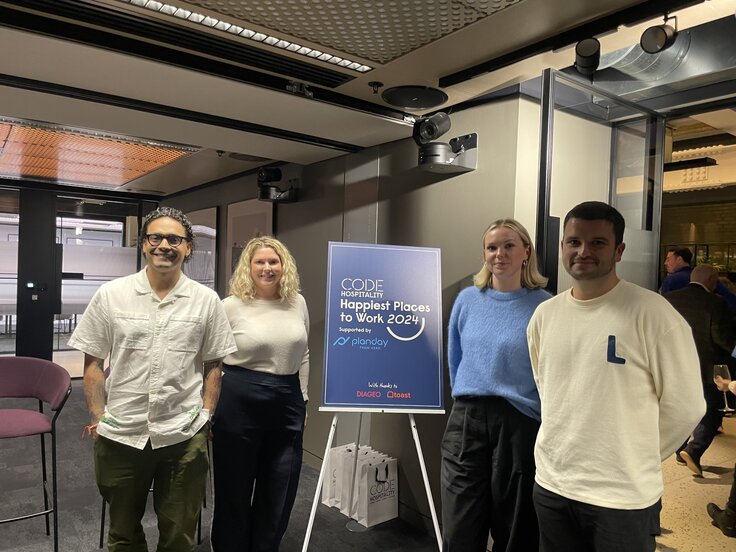
Article
4 min read
Creating a Happy Workplace: The Experts Share Their Tips
Alex Francis
Nov 18, 2024
Chapters
In hospitality, a happy work environment can be the difference between missed shifts and high staff turnover, and a dedicated team full of motivated people.
We know that staff happiness is a vital part of any hospitality business, so we were delighted to partner with CODE to find Hospitality's Happiest Places to Work 2024.
And after much deliberation from our panel of industry experts, we found 22 of the happiest hospitality teams you could ever hope to meet.
To find out exactly what’s needed to make a happy team, we sat down with a few of the finalists to get their thoughts on workplace culture, the importance of communication, and the secret ingredients to happiness at work.
The expert panel




Foster the right culture
The culture of a workplace is a tricky one: it can be hard to define, there are usually lots of different factors that can impact it, and it can seem hard to change.
But get it right and it can lead to a more motivated staff, happier shifts and better customer service. So, what can you do to encourage that positive culture?
“It’s important to understand why people leave and why they are coming in,” says Max Coltart, People and Culture Manager at Forza Wine.
“And don’t be afraid to make a culture first decision. If someone is beginning to nibble away at a healthy culture, try and address it head-on.”
Raj Markandoo, Head of Operations at Bubala, adds: “Engagement surveys and anonymous suggestion forms are a great way to gauge the culture. And the results of these should be used in management and ops meetings, to make sure you’re actually doing something with that information.”
Keep communicating
Communication is absolutely vital to any happy, harmonious team. It’s important to have an open dialogue with your team, no matter how big, so everyone feels heard and more inclined to raise any feedback, problems or concerns in the future.
“Constant communication is important,” says Kelly Abbott, HR Manager at Noble Rot.
“Things like staff forums are great for this, where the employees set the agenda themselves based on the anonymous feedback collected. We also run appraisals with one of the founders every August for all 120 employees. It’s important that staff know what is coming and when.”
Sarah, VP of Growth here at Planday, adds: “There is a need to communicate in many different ways. It’s great to communicate face to face, but generationally we all need different comms. Communicating in a human way first, which is then backed up by something they can digest in their own time, is the most impactful approach.”

Be mental health aware
Our jobs can have a huge impact on our mental health – and hospitality is no different. Research has shown that 85% hospitality workers have experienced poor mental health symptoms in the last 12 months.
Awareness is the key here. It’s important to show your people that you take their mental health seriously, and that you’re going to look after them while they’re at work.
“We provide as many different pathways as possible for people who may want to talk. We have Mental Health First Aiders, and we make sure they are known to everyone,” says Raj
“And we have regular check-ins for anyone who has to take time off, letting them know that we can make adjustments. That it’s not out of the ordinary and can be spoken about.”
Max agrees: “Communication is pretty crucial. It’s important to create optimal relationships and a safe space within the business, so everyone knows who they can speak to if they need to.”
Schedule ahead
Working in hospitality can be a pressurised job at the best of times. But if you don’t know what your hours will be two weeks from now, it becomes even tougher.
Our research has shown that 67% of hospitality workers say more advanced notice of their rotas would improve their life. And when you’ve got staff who feel more secure about their job and their life, you’ll find you have a happier, more cohesive team at work.
“When hospitality workers have more notice to plan their work and their lives, they feel happier,” said Sarah.
“It also gives them financial freedom, by understanding what they are going to earn that month. All of this leads to improved customer service and your teams becoming brand ambassadors. Helping you to improve your service and grow as a business while cultivating happy, healthy teams.”
Kelly added: “We aim to schedule three weeks ahead. It’s one of the most important and impactful parts of the job, and people need that work life balance, along with flexibility and control.”
Max agreed: “Three weeks is the sweet spot. It creates a better relationship with the team and gives everyone more flexibility.”
Keep it fun
Injecting some fun into your work environment can do wonders for team morale. And it doesn’t have to be anything huge or expensive. Just some regular small gestures to bring a bit of positivity into proceedings and put a smile on people’s faces.
“We run a question time session at the start of shifts, to help people get to know each other. It’s not serious or strict, it could simply be what’s everyone’s favourite drink,” says Raj.
“We also let the chefs be creative with snacks after work for the team. Everyone gets the opportunity to make something if they want. And we share appreciation and any photos afterwards.”
Max adds: “At Forza we’re a fun brand. We often run little challenges created by the team, like who can sell the most olives in an evening. It’s about giving people the freedom to try and run with things and enjoy themselves.”
“It’s important to stay humble. We’re just serving people dinner, everything will be fine.”
